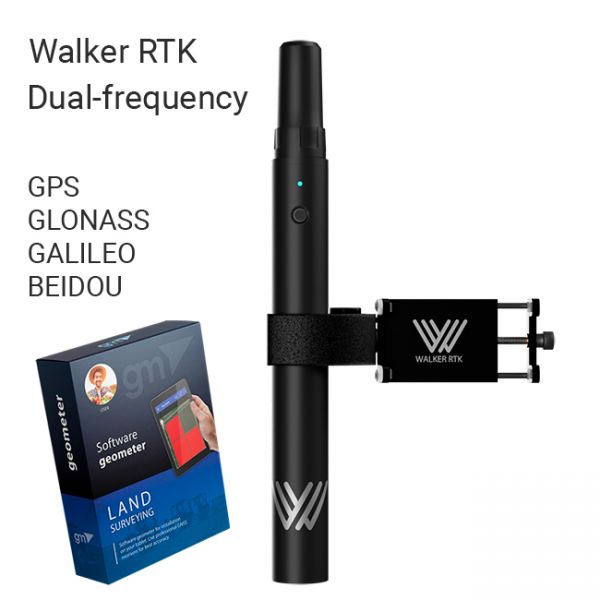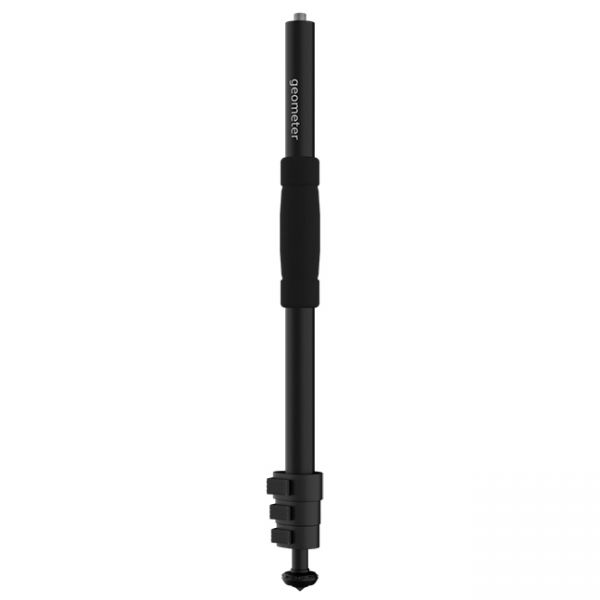Comparison of the two most popular GNSS receivers: GEORA and Walker RTK
17.04.2025At Geometer International, two GNSS receivers have become the most popular choices among our clients: GEORA and Walker RTK. Both devices are reliable, high-precision tools widely used for surveying, agricultural navigation, and other geospatial applications.
Since both receivers operate in RTK mode and provide centimeter-level accuracy, choosing between them can be a bit challenging. In this article, we compare these models from both technical and user standpoints to help you make an informed decision.
RTK Accuracy
In real-world conditions, both receivers deliver almost identical accuracy when working with GNSS corrections in RTK mode:
- GEORA offers a claimed horizontal accuracy of 8 mm and vertical accuracy of 15 mm.
- Walker RTK provides horizontal accuracy of 10 mm and vertical accuracy of 20 mm.
The difference is minimal and generally not noticeable in the field. Both devices are compatible with any GNSS correction service.
Battery Life
- GEORA has a built-in dual battery, providing up to 15 hours of operation on a single charge.
- Walker RTK includes a single battery, delivering up to 8 hours of continuous use.
Satellite Channels
- GEORA supports 1408 channels and works with all major constellations: GPS, GLONASS, GALILEO, BEIDOU, QZSS.
- Walker RTK features 184 channels and also supports GPS, GLONASS, GALILEO, BEIDOU, QZSS.
Despite the difference in channel count, both receivers initialize quickly and maintain a stable fixed solution.
Frequency Support & Base Station Connectivity
- GEORA supports L1, L2, and L5 frequencies, which allows stable operation with base stations located over 50 km away.
- Walker RTK supports L1 and L2 frequencies and can also connect to remote base stations, although initialization may take longer compared to GEORA.
Data Logging & Internal Memory
- GEORA comes with 8 GB of internal memory and supports data logging for post-processing (PPK).
- Walker RTK does not have internal memory and does not support post-processing. The receiver is designed for real-time RTK use and does not support post-processing (PPK).
Battery Life
- GEORA has a built-in dual battery, providing up to 15 hours of operation on a single charge.
- Walker RTK includes a single battery, delivering up to 8 hours of continuous use.
Tilt Compensation
One of GEORA’s key advantages is its integrated IMU sensor (tilt compensator):
- Allows working with pole tilt up to 60° with 1.5 cm accuracy and up to 90° with 2 cm accuracy.
- No need to level the pole using a bubble — tilt is automatically compensated.
- Walker RTK does not support tilt compensation.
Status Indicators
- GEORA includes LED indicators for battery level, Bluetooth status, and GNSS signal status.
- Walker RTK has a single multifunction LED that shows Bluetooth and battery status. Satellite data can be viewed through the software only.
Software Compatibility
Both models come with the SurPad software. For GEORA, it is provided under the name RinoLink.
- RinoLink fully supports the IMU sensor and displays battery status for the GEORA receiver.
- Walker RTK also works with SurPad. Users can perform surveying, stakeout, and other functions, but the software does not show battery status. This does not affect overall functionality.
Package Contents
- GEORA is delivered in a padded textile bag with foam insert. A shockproof hard case is available as an optional upgrade.
- Walker RTK is supplied in a protective carton box with foam insert. A shockproof hard case is available as an optional accessory.
Optional Accessories
- TS180 Telescopic Pole – lightweight and compact: View Product →
- P9IV Rugged Controller – features a touchscreen and physical keyboard, ideal for use in cold weather: View Product →
(Alternatively, you can use any Android smartphone or tablet — the only difference is the lack of a physical keyboard.)
Comparison Table: GEORA vs Walker RTK
| Feature | GEORA | Walker RTK |
|---|---|---|
| Accuracy (H/V) | 8 mm / 15 mm | 10 mm / 20 mm |
| Satellite Channels | 1408 | 184 |
| Supported Systems | GPS, GLONASS, GALILEO, BEIDOU, QZSS | GPS, GLONASS, GALILEO, BEIDOU, QZSS |
| Frequencies | L1, L2, L5 | L1, L2 |
| Base Station Range | Over 50 km | Supported, longer initialization |
| Tilt Compensation (IMU) | Yes (up to 90°) | No |
| Battery Life | 15 hrs, dual battery | 8 hrs, single battery |
| Internal Memory / PPK | 8 GB, supported | Not supported |
| LED Indicators | Battery, Bluetooth, GNSS | Combined Bluetooth/Battery |
| Software | RinoLink (SurPad), full support | SurPad, partial compatibility |
| Package | Soft bag (optional shockproof case) | Carton (optional shockproof case) |
| Battery Status in App | Visible | Not visible |
Final Thoughts
GEORA and Walker RTK are both excellent GNSS receivers capable of delivering stable RTK accuracy down to 1 cm. Your choice depends on the priorities of your project:
- Choose GEORA if you need longer battery life, tilt compensation, extended range, or post-processing functionality.
- Choose Walker RTK if you’re looking for a simpler, more affordable, and compact solution for standard surveying tasks. Additionally, Walker RTK is popular in photogrammetry applications using smartphones thanks to its ability to work with the RTK Camera – 3D Geotag Scanner app by RedCatch.
The Walker RTK with geometer mobile app is a compact and easy-to-use ideal tool for 3D surveying manholes, sidewalks, curbs, steps, landscaping, mapping trenches, and underground utilities such as electricity, gas, water, and sewer lines.
A telescopic aluminum survey pole TS180 is designed for comfortable surveying. The four-section construction delivers reliable stability with the help of solid flip locks.




